The nucleolar protein NIFK promotes cancer progression via CK1α/β-catenin in metastasis and Ki-67-dependent cell proliferation
- PMID: 26984280
- PMCID: PMC4811767
- DOI: 10.7554/eLife.11288
The nucleolar protein NIFK promotes cancer progression via CK1α/β-catenin in metastasis and Ki-67-dependent cell proliferation
Abstract
Nucleolar protein interacting with the FHA domain of pKi-67 (NIFK) is a Ki-67-interacting protein. However, its precise function in cancer remains largely uninvestigated. Here we show the clinical significance and metastatic mechanism of NIFK in lung cancer. NIFK expression is clinically associated with poor prognosis and metastasis. Furthermore, NIFK enhances Ki-67-dependent proliferation, and promotes migration, invasion in vitro and metastasis in vivo via downregulation of casein kinase 1α (CK1α), a suppressor of pro-metastatic TCF4/β-catenin signaling. Inversely, CK1α is upregulated upon NIFK knockdown. The silencing of CK1α expression in NIFK-silenced cells restores TCF4/β-catenin transcriptional activity, cell migration, and metastasis. Furthermore, RUNX1 is identified as a transcription factor of CSNK1A1 (CK1α) that is negatively regulated by NIFK. Our results demonstrate the prognostic value of NIFK, and suggest that NIFK is required for lung cancer progression via the RUNX1-dependent CK1α repression, which activates TCF4/β-catenin signaling in metastasis and the Ki-67-dependent regulation in cell proliferation.
Keywords: NIFK; casein kinase 1 alpha; cell biology; human; lung cancer; metastasis; runx1.
Conflict of interest statement
The authors declare that no competing interests exist.
Figures


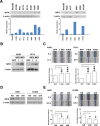
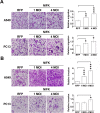
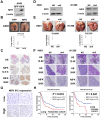

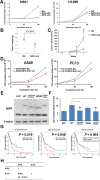
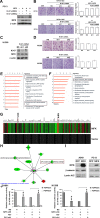



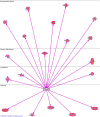
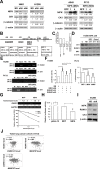





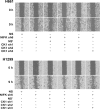
Similar articles
-
The RNA recognition motif of NIFK is required for rRNA maturation during cell cycle progression.RNA Biol. 2015;12(3):255-67. doi: 10.1080/15476286.2015.1017221. RNA Biol. 2015. PMID: 25826659 Free PMC article.
-
Suppression of casein kinase 1alpha in melanoma cells induces a switch in beta-catenin signaling to promote metastasis.Cancer Res. 2010 Sep 1;70(17):6999-7009. doi: 10.1158/0008-5472.CAN-10-0645. Epub 2010 Aug 10. Cancer Res. 2010. PMID: 20699366
-
A novel nucleolar protein, NIFK, interacts with the forkhead associated domain of Ki-67 antigen in mitosis.J Biol Chem. 2001 Jul 6;276(27):25386-91. doi: 10.1074/jbc.M102227200. Epub 2001 May 7. J Biol Chem. 2001. PMID: 11342549
-
RUNX1 promotes tumour metastasis by activating the Wnt/β-catenin signalling pathway and EMT in colorectal cancer.J Exp Clin Cancer Res. 2019 Aug 1;38(1):334. doi: 10.1186/s13046-019-1330-9. J Exp Clin Cancer Res. 2019. PMID: 31370857 Free PMC article.
-
DDX5 promotes proliferation and tumorigenesis of non-small-cell lung cancer cells by activating β-catenin signaling pathway.Cancer Sci. 2015 Oct;106(10):1303-12. doi: 10.1111/cas.12755. Epub 2015 Sep 3. Cancer Sci. 2015. PMID: 26212035 Free PMC article.
Cited by
-
The Ki-67 and RepoMan mitotic phosphatases assemble via an identical, yet novel mechanism.Elife. 2016 Aug 30;5:e16539. doi: 10.7554/eLife.16539. Elife. 2016. PMID: 27572260 Free PMC article.
-
CTLA-4 silencing could promote anti-tumor effects in hepatocellular.Med Oncol. 2024 Jul 2;41(8):193. doi: 10.1007/s12032-024-02361-1. Med Oncol. 2024. PMID: 38955918
-
Collagen modifications predictive of lymph node metastasis in dogs with carcinoma in mixed tumours.Front Vet Sci. 2024 Mar 6;11:1362693. doi: 10.3389/fvets.2024.1362693. eCollection 2024. Front Vet Sci. 2024. PMID: 38511192 Free PMC article.
-
Screening membraneless organelle participants with machine-learning models that integrate multimodal features.Proc Natl Acad Sci U S A. 2022 Jun 14;119(24):e2115369119. doi: 10.1073/pnas.2115369119. Epub 2022 Jun 10. Proc Natl Acad Sci U S A. 2022. PMID: 35687670 Free PMC article.
-
Ki-67: more than a proliferation marker.Chromosoma. 2018 Jun;127(2):175-186. doi: 10.1007/s00412-018-0659-8. Epub 2018 Jan 10. Chromosoma. 2018. PMID: 29322240 Free PMC article. Review.
References
Publication types
MeSH terms
Substances
Grants and funding
LinkOut - more resources
Full Text Sources
Other Literature Sources
Medical
Molecular Biology Databases

